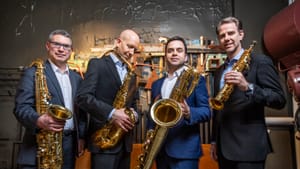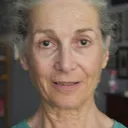Stay in the Loop
BSR publishes on a weekly schedule, with an email newsletter every Wednesday and Thursday morning. There’s no paywall, and subscribing is always free.
Still vibrant at 202 (and counting)
PCMS presents the Musical Fund Society of Philadelphia’s 200th Anniversary Concert

The Musical Fund Society of Philadelphia remains vibrant after more than two centuries, as proven by its bicentennial concert on May 1, 2022 (a celebration delayed for two years), presented by the Philadelphia Chamber Music Society (PCMS) and featuring Philadelphia-inspired premieres with Network for New Music, PRISM Quartet, and the Rolston String Quartet.
Musical Fund Society (MFS) founders presented the best music available, and didn’t discriminate by race in their pre-emancipation era. They paid Black bugler Francis Johnson and his band $140, a princely sum at the time, to play at an MFS ball for General Lafayette in 1824. MFS was also receptive to music by European composers who were not widely accepted by American audiences, like the stormy Ludwig van Beethoven. And another feather in their cap is that they presented the American premiere of Wolfgang Amadeus Mozart’s 1791 opera, Die Zauberflöte (The Magic Flute).
Mesmerizing with Tania León
For its bicentennial concert at the Kimmel’s Perelman Theater, MFS commissioned four new musical works with Philadelphia as a theme. One of them is by Cuban American composer Tania León (winner of the 2021 Pulitzer Prize in Music for her piece Stride), who was unable to attend the date. Her premiere will be presented in November 2022.
Two other pieces by León were on the program. To and Fro: Mood 1; Mood 2; Mood 3; Mood 4 was spellbindingly performed by soprano Lucy Baker, her seductive voice and presence matching the jazzy sorcery of pianist Miloš Repický. Baker delivered the whimsical text by Alison Knowles clearly, singing into the piano soundboard while held piano notes resounded in response to her voice. She even managed a piercing downward glissando hum. The performance was mesmerizing.
Violinist Maya Anjali Buchanan performed the other piece by León, Axon, for violin and interactive electronics. Mari Kimura’s prepared interactive electronic MAX/SMP was created from samples of two other León works. These recorded sounds responded to Buchanan’s violin sounds and refracted them. The result was certainly not easy listening, though the innovation deserves respect.
Well-deserved applause
Roberto Sierra, a Latin Grammy winner and composer of Concerto for Orchestra (commissioned by the Koussevitzky Music Foundation and the Philadelphia Orchestra for its centennial), wrote Graffiti II, a collection of 14 miniatures of rhythmic and motivic complexity. It was performed by the agile saxophonists of the PRISM Quartet, who use key-slaps and slap-tonguing as a matter of course. The quartet has a wonderful sense of ensemble as its members nimbly create the infinite nuances of street art reflecting the composer’s expression of “simple lines, vibrant colors, and geometric shapes.”
University of Chicago professor of composition Augusta Read Thomas, also the director of the Chicago Center for Contemporary Composition, wrote Magic Gardens as her Philadelphia theme, a soundscape inspired by artist Isaiah Zagar’s Magic Gardens. Just as Zagar’s mosaics reflect prismatic scatterings of light on shards of glass and mirrors, Thomas crafted shards of melody peppered with pizzicato, played in spurts of phrases in the scherzo by the Rolston Quartet. The second movement, “Celebration,” was a warm, lush, harmonically rich section of longer note values and chord progressions. Thomas and Zagar were in the audience for the premiere.
Composer and Duke University professor of music Stephen Jaffe created Three Arcs (Chamber Concerto No. 5) for Philadelphia’s Network for New Music. (Jaffe studied at the University of Pennsylvania with George Crumb, George Rochberg, and Richard Wernick.) Conductor Jan Krzywicki was crystal clear in directing the Network for New Music ensemble and the Pennsylvania Girlchoir and Garden State Girlchoir.

The first movement, “Arc across the vale,” is an imaginative fanfare for viola processional and ensemble, dramatically played by Burchard Tang as he strode on the stage. The second movement, “Still life with Bell,” is a tribute to a bronze bell created by Toshiko Takaezu, which hangs beside the Philadelphia Museum of Art. Musically, Jaffe incorporated the bell sound everywhere: guitar, xylophone, soprano voices, and strings.
The third movement, “At Liberty (March Fantasy)” has recitations and chorus, inspired by the Reginald Beauchamp sculpture honoring Crispus Attucks, The whispering bells of freedom, which is in front of the African American Museum in Philadelphia. The score has a vivid percussion part with car horns, bells, marimba, and xylophone ably played by Mika Godbole. In spite of the lusty percussion, Jaffe’s skillful orchestration allowed all of the parts to be heard clearly. He, and this stellar piece, certainly deserved the enthusiastic applause from the audience.
An excellent program
The concert’s excellent program book merits a special salute. It contains myriad information about the Musical Fund Society, the concert program, and a review of 19th-century stars presented at the Musical Fund Hall, as well as a painstakingly researched article by Gary Galván, librarian at the Fleisher Collection of the Parkway Central Library of Philadelphia. This program should be a bound companion to the one created for MSF’s 150th anniversary in 1970.
The Musical Fund Society of Philadelphia is still providing inspiration and new ideas. Long may it last.
What, When, Where
Musical Fund Society’s 200th Anniversary Concert, presented by the Philadelphia Chamber Music Society. Augusta Read Thomas; Magic Gardens. Tania León; To and Fro: Mood 1; Mood 2; Mood 3; Mood 4 and Axon, for violin and interactive electronics. Roberto Sierra; Graffiti II. Stephen Jaffe; Three Arcs (Chamber Concerto No. 5). Rolston String Quartet, PRISM Quartet, and Network for New Music with the Pennsylvania Girlchoir and Garden State Girlchoir. May 1, 2022 at the Kimmel Cultural Campus's Perelman Theater, 300 South Broad Street, Philadelphia. musicalfundsociety.org.
All audience members aged five years or older must show proof of full Covid-19 vaccination to enter the Kimmel Cultural Campus. Children younger than five years must provide a negative PCR test taken within 72 hours of a scheduled event. Masks must be worn at all times. Seating is not distanced.
Accessibility
The Kimmel Cultural Campus is an ADA-compliant venue. Patrons can purchase wheelchair seating or loose chairs online, by calling Patron Services at (215) 893-1999, or by emailing [email protected]. With advance notice, Patron Services can provide options for personal care attendants, American Sign Language, Braille tickets and programs, audio descriptions, and other services.
Sign up for our newsletter
All of the week's new articles, all in one place. Sign up for the free weekly BSR newsletters, and don't miss a conversation.

 Margaret Darby
Margaret Darby